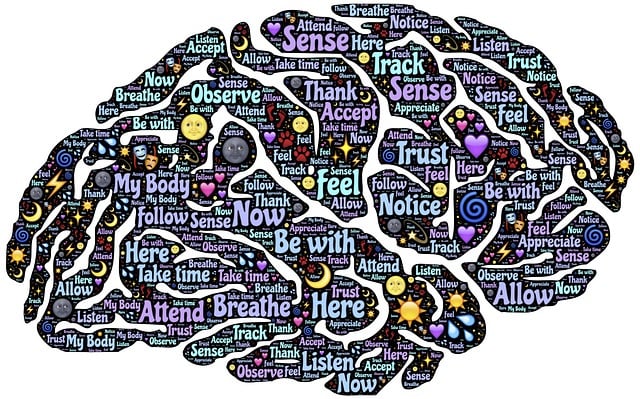Highlands Ranch Play Therapy is a specialized approach leveraging data-driven insights to improve children's mental health. Therapists collect comprehensive data, including demographics, therapy goals, and session outcomes, to gain a holistic view of each client. By combining quantitative analysis with cultural sensitivity, they identify trends like depression, compassion cultivation, and self-awareness, tailoring interventions for optimal mental wellness. Advanced statistical techniques help assess intervention effectiveness, track improvements, and align practices with Mental Health Policy goals. This data-informed approach enhances crisis intervention, risk assessments, and resource allocation, transforming play therapy into a game-changer for Highlands Ranch residents' emotional well-being.
Mental health data analysis is a powerful tool for understanding and enhancing play therapy practices, especially in diverse communities like Highlands Ranch. This article explores the intricacies of mental health data interpretation, from establishing a robust foundation for effective analysis to advanced statistical techniques. We delve into innovative data collection methods specific to play therapy sessions, uncovering valuable insights tailored to the unique needs of children and families in Highlands Ranch. By identifying patterns and trends, therapists can make data-driven decisions, ultimately improving therapeutic outcomes.
- Understanding Mental Health Data: The Foundation of Effective Analysis
- Data Collection Methods in Play Therapy: Unlocking Insights in Highlands Ranch
- Statistical Techniques for Interpreting Play Therapy Session Outcomes
- Identifying Patterns and Trends: What Do the Numbers Reveal?
- Applying Data-Informed Decisions to Enhance Therapy Practices in Highlands Ranch
Understanding Mental Health Data: The Foundation of Effective Analysis

Understanding Mental Health Data is the cornerstone upon which effective analysis and interpretation stand. In Highlands Ranch Play Therapy, for instance, therapists collect diverse data points including client demographics, therapy goals, progress notes, and treatment outcomes. This holistic approach allows for a nuanced grasp of each individual’s unique mental health landscape, encompassing not just symptoms but also contextual factors that influence well-being. By delving into these data sets, therapists can identify trends, patterns, and correlations that guide tailored interventions.
The process involves not only quantitative analysis but also cultural sensitivity in mental healthcare practice. Recognizing the impact of cultural backgrounds on mental wellness, therapists must interpret data with an awareness of potential biases or variations in expression of distress across cultures. This consideration ensures that therapy remains effective and inclusive, ultimately fostering better anxiety relief and enhancing overall mental wellness through initiatives like Mental Wellness Podcast Series Production.
Data Collection Methods in Play Therapy: Unlocking Insights in Highlands Ranch

In Highlands Ranch, Play Therapy stands as a powerful tool for mental health professionals, offering unique insights into children’s emotional and psychological states. This therapeutic approach involves structured games, activities, and conversations designed to help young clients express their feelings and work through challenges. Data collection methods in play therapy are diverse and nuanced, incorporating both direct observation and interactive participation. Therapists meticulously record behaviors, language patterns, and emotional indicators displayed by the child during sessions, allowing for a comprehensive analysis of their mental health status.
Through these data collection techniques, professionals can identify underlying issues such as depression prevention, compassion cultivation practices, and self-awareness exercises that may not be readily apparent through traditional means. The play environment provides a safe space where children can explore their emotions, resolve conflicts, and develop coping strategies. By analyzing the collected data, therapists gain valuable insights into each child’s unique journey, enabling them to tailor interventions for optimal mental health outcomes in Highlands Ranch and beyond.
Statistical Techniques for Interpreting Play Therapy Session Outcomes

In the realm of Highlands Ranch Play Therapy, statistical techniques play a pivotal role in interpreting session outcomes, enabling therapists to gain profound insights into child development and mental health progress. Advanced data analysis methods allow professionals to assess the effectiveness of play therapy interventions, track improvements over time, and tailor treatments accordingly. These techniques include regression analysis, which helps predict outcomes based on initial assessment data, and factor analysis, aiding in identifying underlying constructs or themes within the session data. By employing these statistical tools, therapists can quantify changes, measure treatment impact, and make informed decisions to optimize therapeutic outcomes for each unique client.
In addition to these analytical approaches, considerations of Cultural Sensitivity in Mental Healthcare Practice are paramount. Therapists must be adept at interpreting play therapy sessions through a lens of cultural context, recognizing that children from diverse backgrounds may express emotions and engage in play differently. This nuanced understanding fosters a more inclusive and effective therapeutic environment. Moreover, integrating insights from Mental Health Policy Analysis and Advocacy ensures that play therapy practices align with broader mental health goals, promoting continuous improvement and positive community outreach, as seen in successful Community Outreach Program Implementation initiatives.
Identifying Patterns and Trends: What Do the Numbers Reveal?

Identifying patterns and trends within mental health data is akin to piecing together a complex puzzle. By carefully analyzing statistical information, professionals can uncover valuable insights that reveal hidden connections and correlations. These numbers don’t just represent figures; they are windows into understanding individual experiences, collective behaviors, and emerging mental health landscapes. For instance, in Highlands Ranch Play Therapy, tracking the prevalence of certain issues over time could highlight specific challenges faced by the community, guiding the development of targeted interventions.
Through this process, mental health professionals can uncover trends that inform effective empathy-building strategies. By identifying patterns, they can better equip themselves with crisis intervention guidance, ensuring a proactive approach to support individuals and communities. Moreover, risk assessments become more precise when data analysis reveals vulnerable populations, enabling the allocation of resources for tailored programs like those offered in Highlands Ranch.
Applying Data-Informed Decisions to Enhance Therapy Practices in Highlands Ranch

In Highlands Ranch, applying data-informed decisions to enhance therapy practices has become a game-changer in play therapy. By meticulously analyzing mental health data, therapists can tailor their approaches to better meet each child’s unique needs. This evidence-based strategy not only improves treatment outcomes but also fosters more effective and personalized therapy sessions. For instance, understanding specific triggers for anxiety or stress among children can lead to targeted interventions that go beyond traditional play therapy techniques.
Integrating Self-Care Routine Development for Better Mental Health is a significant aspect of this approach. By recognizing patterns in data related to anxiety relief and stress reduction methods, therapists can guide parents and caregivers in establishing routines that support children’s emotional well-being. This proactive step not only enhances the therapeutic process but also empowers families with tools to manage mental health challenges outside of formal therapy sessions, ultimately contributing to a more holistic and sustainable improvement in mental health for Highlands Ranch residents.
Mental health data analysis is a powerful tool for play therapy in Highlands Ranch, enabling practitioners to make informed decisions and enhance treatment outcomes. By understanding data collection methods, employing statistical techniques, and identifying meaningful patterns, therapists can tailor their practices to meet the unique needs of each child. This data-driven approach ensures that play therapy in Highlands Ranch remains effective, accessible, and responsive to the evolving mental health landscape.














